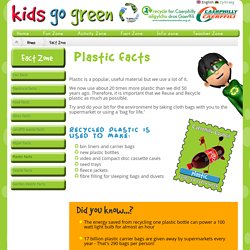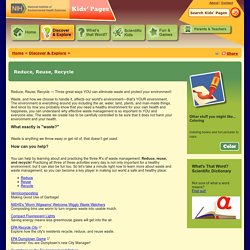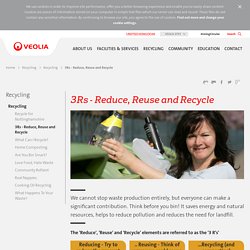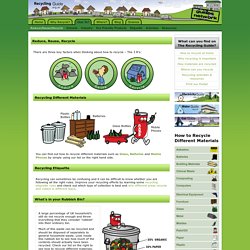

Recycling Facts For Kids. Plastic facts. Plastic is a popular, useful material but we use a lot of it.

We now use about 20 times more plastic than we did 50 years ago. Therefore, it is important that we Reuse and Recycle plastic as much as possible. Try and do your bit for the environment by taking cloth bags with you to the supermarket or using a 'bag for life.' Recycled plastic is used to make: bin liners and carrier bags new plastic bottles video and compact disc cassette cases seed trays fleece jackets fibre filling for sleeping bags and duvets Did you know...? The energy saved from recycling one plastic bottle can power a 100 watt light bulb for almost an hour17 billion plastic carrier bags are given away by supermarkets every year - That's 290 bags per person!
Watch the video below from National Geographic to see how plastic bottles can be made into clothing: Fun Facts on Recycling for kids *** What happens to your recycled Plastic, Paper, Tins and Cans ? What happens to waste. Captain Busta: resources for primary school children. Reduce, Reuse, Recycle. Reduce, Reuse, Recycle — Three great ways YOU can eliminate waste and protect your environment!

Waste, and how we choose to handle it, affects our world's environment—that's YOUR environment. The environment is everything around you including the air, water, land, plants, and man-made things. And since by now you probably know that you need a healthy environment for your own health and happiness, you can understand why effective waste management is so important to YOU and everyone else. The waste we create has to be carefully controlled to be sure that it does not harm your environment and your health. What exactly is "waste? " Waste is anything we throw away or get rid of, that doesn’t get used. How can you help? You can help by learning about and practicing the three R's of waste management: Reduce, reuse, and recycle!
VermicompostingMaking Good Use of Garbage! NIEHS's 'Worm Wigwams' Welcome Wiggly Waste WatchersComposting bins use worm to turn organic waste into usable mulch. BBC Bitesize - KS2 Science - Recycling - what's the best way to sort waste? Tips on fighting waste. Yahoo. 3Rs - Reduce, Reuse and Recycle. We cannot stop waste production entirely, but everyone can make a significant contribution.

Think before you bin! It saves energy and natural resources, helps to reduce pollution and reduces the need for landfill. The 'Reduce', 'Reuse' and 'Recycle' elements are referred to as the '3 R's' Reducing - Try to reduce the amount of waste you produce, as this is the best way to help the environment! If you cannot avoid producing the waste, try… .. ...Recycling (and composting) This enables the materials you throw away to be used again by making them into new products. If items cannot be reused or recycled it is sometimes possible to recover the energy that they contain through a waste treatment process. At Home Reduce Avoid giving presents with excess packaging. Reuse Recycle Shopping Shopping provides many opportunities for using your influence as a consumer to purchase low-waste products. Choose products that come in packaging which you know can be recycled. Young Families At work In your garden. Recycling Guide.
Reduce, Reuse, Recycle « Recycling Guide. There are three key factors when thinking about how to recycle – The 3 R’s: Recycling Different Materials You can find out how to recycle different materials such as Glass, Batteries and Mobile Phones by simply using our list on the right hand side.

Recycling Etiquette Recycling can sometimes be confusing and it can be difficult to know whether you are following all the right rules. Improve your recycling efforts by learning some recycling etiquette rules and check out which type of collection is best and why different areas recycle and collect in different ways. What’s in your Rubbish Bin? A large percentage of UK household’s still do not recycle enough and throw everything that they consider ‘rubbish’ into their ordinary bin. Much of this waste can be recycled and should be disposed of separately to general household waste.